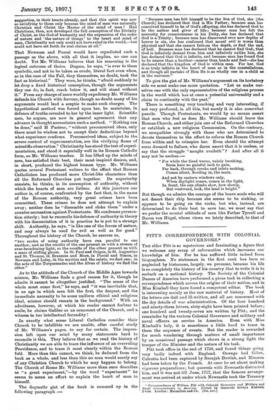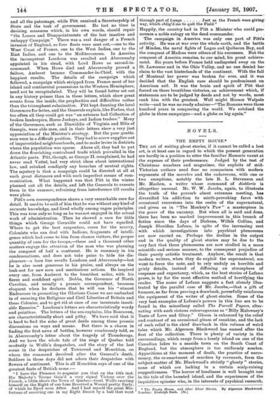PITT'S CORRESPONDENCE WITH COLONIAL GOVERNORS.*
THE elder Pitt is so mysterious and fascinating a figure that we welcome any scrap of information which increases our knowledge of him. For he has suffered little indeed from biographers. No statesman in the first rank has been so neglected by historians, largely, we presume, because his life is so completely the history of his country that to write it is to embark on a national history. The Society of the Colonial Dames of America have performed a pious task in collecting a correspondence which covers the origins of their nation, and in Miss Kimball they have found a competent editor. The book is interesting mainly as the raw material of history. Most of the letters are dull and ill-written, and all _are concerned with the dry details of war administration. Of the four hundred and ninety-three letters, sixty-eight have been printed before ; one hundred and twenty-seven are written by Pitt; and the remainder by the various Colonial Governors and military and naval officers on service in America. Even with Miss Kimball's help, it is sometimes a little hard to trace in them the sequence of events. But the reader is rewarded for much wandering through matters of small importance by an occasional passage which shows in a strong light the temper of the Minister and the nature of his task.
Pitt took office in the end of 1756, and found things going very badly indeed with England. Oswego had fallen, Calcutta had been captured by Snrajah Dowlah, and Minorca had been taken by the French. At once he set about making vigorous preparations ; but quarrels with Newcastle distracted him, and it was not till June, 1757, that the famous arrange- ment was arrived at under which Newcastle took the Treasury
• Correspondence of Wiltiant Pitt with Colowial Governors and Military and Naval Commissioners in America. EdIted by Gertrude Selwyn Kimball. 2 vols. London Macmillan sad Co. 122a. mt..]
and all the patronage, while Pitt received a Secretaryship of State and the task of government. He lost no time in devising measures which, in his own words, should repair "pie Losses and Disappointments of the last inactive and unhappy Campaign." There was a real danger of a French invasion of England, so four fleets were sent out,—one to the West Coast of France, one to the West Indies, one to the RUA Indies, and one to the Mediterranean. In America the incompetent Loudoun was recalled and Abercromby appointed in his stead, with Lord Howe as second-in- command. When Howe died and Abercromby proved a failure, Amherst became Commander-in-Chief, with the happiest results. The details of the campaign which followed, a campaign which stripped from France most of her island and continental possessions in the Western Hemisphere, need not be recapitulated. They will be found better set out in any history primer than in these letters, which show great events from the inside, the perplexities and difficulties rather than the triumphant culmination. Pitt kept dunning the local Governors for levies, and the Generals explain, like Forbes, that too often all they could get was "an extream bad Collection of broken Innkeepers, Horse Jockeys, and Indian traders." Many of the Governors, such as Dinwiddie of Virginia and Ellis of Georgia, were able men, and in their letters show a very just appreciation of the Minister's strategy. But the poor gentle- men were in a difficult position. They bad to screw supplies out of impoverished neighbourhoods, and to make levies in districts where the population was sparse. Above all, they had to put down the flourishing contraband trade which prevailed in the Atlantic ports. Pitt, though, as George IL complained, he had never read Vette], had very strict ideas about international law, and rebuked condignly any breaches of neutral rights. The mystery is that a campaign could be directed at all at such great distances and with such imperfect means of com- munication. What happened was that Pitt in the winter planned out all the details, and left the Generals to execute them in the summer, refraining from interference till results were plain.
Pitt's own correspondence shows a very remarkable care for detail. It used to be said of him that be was without any kind a accurate knowledge, and lived wholly among vague principles. This was true only so long as he was not engaged in the actual work of administration. Then he showed a care for little things which George Grenville could not have equalled. Where to get the best carpenters, cures for the scurvy, Colonists who can deal with Indians, fragments of intelli- g
ence which had come to him front chance visitors, the proper quantity of rum for the troops,—these and a thousand other matters engage the attention of the man who was planning the conquest of half a continent. He is summary in his condemnations, and does not take pains to hide his dis- pleasure—a bare line recalls Londonn and Abercromby—but be is also most generous in his praise, and always on the look-out for new men and meritorious actions. He inspired every one, from Amherst to the humblest sailor, with his fierce and confident spirit. Dobbs, the Governor of North Carolina, and usually a prosaic correspondent becomes eloquent when he declares that he will use Lis "utmost Endeavour in promoting the Glorious Cause we are embarked in of securing the Religious and Civil Liberties of Britain and these Colonies, and to get rid at once of our inveterate insati- able Enemies." Loudoun's letters are characteristically wordy and pointless. The letters of the sea-captains, like Boscawen, are characteristically short and pithy. We have said that it is hard to find the echo of great deeds among these prosaic discussions on ways and means. But there is a charm in finding the first news of battles, however cumbrously told, as in Abercromby's letter about the tragedy of Ticonderoga. And we have the whole tale of the siege of Quebec told modestly in Wolfe's despatches, and the story of the last scene in the despatches of Townsend and Monckton, on whom the command devolved after the General's death. Soldiers in those days did not adorn their desiatches with flowers of sentiment. This is all Monckton says of one of the greatest feats of British arms :— "I have the Pleasure to acquaint you that on the lath inst.
• His Majesty's Troops Gain'd a very signal Victory over the French, a little above the Town of Quebec—Goal. Wolfe exerting himself on the Right of our Line Received a Wound pretty. Early, of which he Dyed soon After. And I had myself the great Mis- fortune of receiving one in my Right Breast by a ball that went through part of Lunge Just as the French were giving; way, which oblig'd me to quit the Field."
Happily, the country had in Pitt a Minister who could pro- nounce a noble eulogy on the dead commander. , The campaign in America was only one part of Pitta activity. He was at war over the whole earth, and the battle of Minden, the naval fights of Lagos and Quiberon Bay, and the conquest of Madras were others of his successes. But-the conquest of America remains, to our mind, his great achieve- ment. Six years before France held undisputed sway on the St. Lawrence and in the Ohio Valley, and no one denied her claim to the vast hinterlands of the continent. With the fall of Montreal her power was broken for ever, and it was decided that the English race should be predominant on American soil. It was the brain and spirit of Pitt that forced on these breathless victories, an achievement which, if statesmen are to be judged by deeds and not by words, must rank him with the greatest. Well might Horace Walpole write—and he was no ready admirer—" The Romans were three hundred years in conquering the world. We subdued the globe in three campaigns—and a globe as big again."























































 Previous page
Previous page